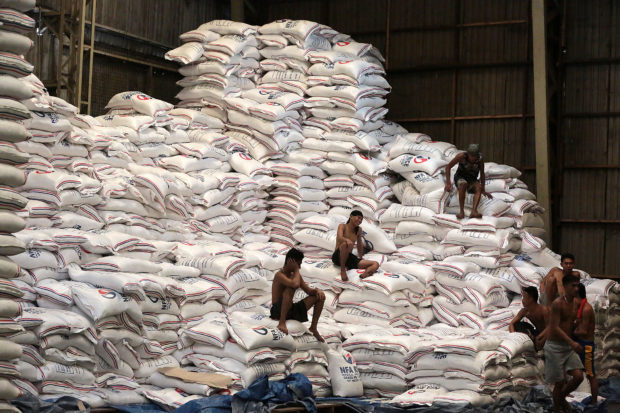‘NFA can keep 60-day buffer stock only through rice importation’

Laborers take a break from loading sacks of rice imported from Vietnam in the National Food Authority (NFA) warehouse in Quezon City on Tuesday, September 4, 2018. The National Food Authority and Department of Agriculture came under fire following the spike of rice prices in the market. About 300,000 tons of imported rice are sitting at the ports in Subic and Tabacco, Albay as authorities try to quell a weevil infestation. INQUIRER PHOTO / GRIG C. MONTEGRANDE
President Duterte’s directive to the National Food Authority (NFA) to maintain a 60-day buffer stock could be done only through importation, according to Senator Cynthia Villar.
During the Meet Inquirer Multimedia forum on Tuesday, Villar, chair of the Senate committee on agriculture and food, said that with the current lean season, the only way to beef up the agency’s inventory was through importing rice.
“If they would maintain their buffer stock, they have to import. Right now, we’re in the planting season,” she said.
The lean months, which stretches from July to September, is when the country’s rice farmers are planting and rice supply is at its lowest.
The NFA is mandated to maintain a 15-day buffer during the regular season and a 30-day buffer during the lean season.
But with the delay in rice shipments, its current inventory is good for only four days.
Latest data from the Department of Agriculture show that nationwide rice stock, including those held by the private sector, is good for only 45 days. This is half the country’s usual rice inventory of 90 days.
‘No rice shortage’
Public markets now have long lines of consumers who want to avail themselves of cheaper rice from the NFA.
Villar assured the public, however, that there was no rice shortage in the country.
“What happened was all the supply of the rice went into the hands of the traders,” she said.
Lawmakers seem to disagree on what the NFA function should be once the limit on rice imports is lifted.
Villar said the agency would lose its power to import under the Senate version of the rice tariffication bill.
“Under the rice tariff model, there would be liberation of rice. The NFA will have no more power to import rice. That function will not be there anymore,” she said.
But the House version of the bill, which was approved last month, wants the NFA to retain its import function to ensure a stable supply and prices of rice. It would also continue giving out permits to eligible importers from the private sector.
The rice tariffication measure allows imports to enter the country without limit so long as these are slapped with a tariff.
It provides for the creation of the Rice Competitiveness Enhancement Fund, which would consist of all duties collected from rice imports. The fund would be used to help improve the competitiveness of local rice farmers.
Villar said the Department of Finance was considering a smaller agency to handle the buffer stock.
The senator noted the need to review the existence of the NFA, especially after it failed to stabilize the supply and price of rice.
Lawmakers and industry groups have been calling for the abolition of the agency and the resignation of its chief, Jason Aquino.
According to economic managers, this has led to high rice prices given the tight supply of affordable rice in the market.